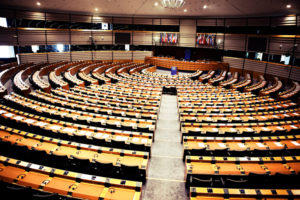How relay interpreting works in practice

From September to November and from February to May it’s conference season in Brussels, which means that the need for interpreting services increases significantly.
In November 2017, we provided interpreting services for several meetings of MEPs in the European Parliament, the United Nations Industrial Development Organization, the Greek Energy Forum, and Medtech Europe. We also organised Spanish interpreting services for the COP 23 climate change summit in Bonn.
Recently we organised interpreting services in the German, French and Italian languages for an agricultural meeting of MEPs in the European Parliament, and I was lucky enough to attend the event. As interpreters usually work in pairs, six interpreters went to the meeting to carry out language mediation. In such cases, our company is happy to provide an on-site coordinator from the project management team, who is responsible for acting as a first point of contact for the client and for the interpreters.
Nowadays, so-called relay interpreting is used at multilingual conferences. This means that the first interpreter listens to the speaker and interprets the message into a target language that is common to the other interpreters. This is called the pivot language, which is – most of the time – English. The second interpreter listens to the English interpreting and interprets it into a third language for those members of the meeting who speak neither the first nor the second languages.
Let’s see how it works in practice: at this meeting there were English, German, Italian and French speakers in the audience. The first speaker started his presentation in Italian, therefore the Italian booth interpreted his message into English. The interpreters in the French and German booths listened to the English interpreting and interpreted the message into their mother tongues, namely French and German. This is how we were able to provide simultaneous Italian-French and Italian-German interpreting without having interpreters in these language combinations.
Relay interpreting is extremely demanding as interpreters have to depend on the English relay for the whole meeting. Basically, the original message is translated twice before reaching the audience. This is why it is really essential to work with highly professional interpreters and proper technical equipment. Eurideas always works with highly skilled interpreters; most of them are accredited to the European institutions and have at least five years of experience.
By Dóra Rapcsák, Eurideas project management team
Get a first-hand experience on how our language services can contribute to your success! Get in touch with us for a quote if you need translation or any relevant services.
To stay updated with our latest SPECIAL OFFERS and to receive our regular newsletter, please subscribe here.
